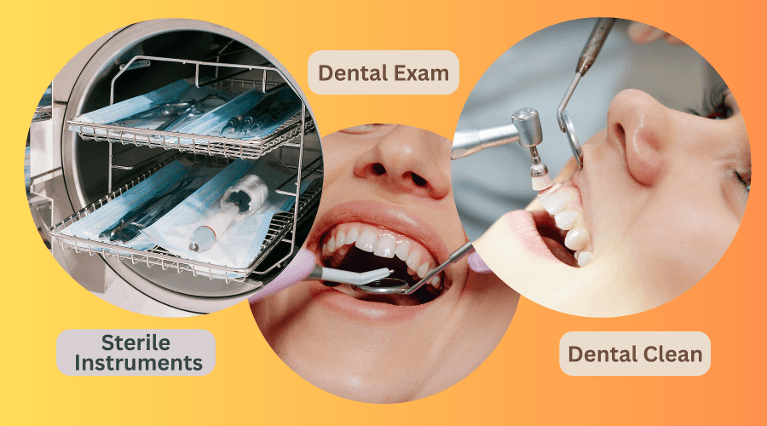
Maintaining good dental hygiene is essential for preventing dental problems and ensuring overall oral health. Here are some important tips for effective dental hygiene:
Daily Oral Care Routine
1. Brush Twice a Day
Brush your teeth at least two minutes twice daily. Once in the morning and once before bed. Use fluoride toothpaste to help strengthen tooth enamel and prevent dental decay.
2. Proper Brushing Technique
Use a soft-bristled small brush-head toothbrush. Brush for at least two minutes. Angle the brush at a 45-degree angle to your gums and use gentle small circular motions to clean the front, back, and chewing surfaces of your teeth. Don't forget to brush your tongue to help remove bacteria and freshen your breath. Alternatively, you can use a tongue scraper.
3. Floss or use inter-dental brush
Floss at least once a day to remove plaque and food particles from between your teeth and along the gum line, where your toothbrush may not reach. For those who have gum disease or orthodontic therapy, interdental cleaning should be done after every meal.
4. Use Waterpik
Consider using waterpik to help flush the bulk of food debris before brushing and interdental cleaning. Waterpik is especially good to clean impacted wisdom teeth, dental implants, orthodontic braces. However, waterpik should be used as an additional tool to aid cleaning, it is not to replace dental flossing or interdental brush.
Dietary Considerations
5. Limit Sugar Intake
Reduce the consumption of sugary foods and beverages, as they can contribute to tooth decay. Choose healthier snacks like fruits, vegetables, nuts, and cheese. Most processed food contains high level of sugar. It is the frequency of sweet food or drinks exposure that is more detrimental to oral health. The quantity is less important. Hence, bundle you sweets together with your main meals and limit snacking between meals.
6. Stay Hydrated
Drink plenty of water, especially fluoridated water, to help wash away food particles and bacteria and maintain saliva production, which is important for neutralizing acids in the mouth. Avoid hydrating with sports drink or any sweet drinks. Consider flavoured water over fizzy drinks or sports drinks.
Regular Dental Visits
7. Schedule Regular Check-Up
Visit your dentist every six months for routine check-ups and professional cleanings. This helps catch potential problems early and maintains optimal oral health. Consider your six-monthly dental check-ups a necessity similar to going to the hair dresser routine.
8. Discuss Your Dental Needs
Talk to your dentist about any specific concerns or dental products that may be beneficial for your oral health. For instance, people with sensitive teeth can use desensitising toothpaste such as Sensodyne Rapid toothpaste. Other issues such as dry mouth, halitosis, gum bleeding, sore jaw, tension headache, clicking jaw joints, etc. Your dentist can give you their professional recommendations.
Protecting Your Teeth
9. Use a Dental Guard and Occlusal Splint
If you grind your teeth at night (bruxism) or participate in contact sports, consider using a dental guard to protect your teeth from tooth wear or fracture.
10. Limit Acidic Foods and Beverages
Foods and drinks high in acid, such as citrus fruits and sodas, can erode enamel. Rinse your mouth with water after consuming acidic items. Alternatively, chewing bicarbonate tablets or a piece of cheese can neutralise the acid.
Additional Tips
11. Replace Your Toothbrush
Change your toothbrush or toothbrush head every two months, or sooner if the bristles are frayed. Only use Soft or Super-soft toothbrush.
12. Educate Kids on Dental Care
Teach children about the importance of dental hygiene and help them establish a proper brushing and flossing routine early on. Encourage children not to suck dummy, thumb, or pen persistently as this will alter the shape of the jaw and dental development. Restrain from bottle feeding your child through the night. This can lead to severe dental decay.
13. Avoid Tobacco Products
Smoking and chewing tobacco can lead to gum disease, tooth decay, and oral cancer. Passive smoking by the people around you while you smoke is more detrimental to their health. Quitting improves oral and overall health.
14. Be Mindful of Medications
Some medications can cause dry mouth, which increases the risk of tooth decay. Speak with your healthcare provider if you experience dry mouth; they may suggest alternatives or treatments. Many antidepressants can cause nocturnal bruxing.
By incorporating these dental hygiene tips into your daily routine, you can help maintain a healthy smile and contribute to your overall health.
